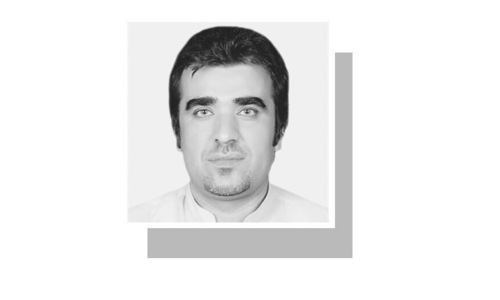The past week was significant for Pakistani women as our Senate unanimously passed two pro-women bills which now specifically criminalise acid attacks on women and other anti-women customs such as wani and savara.
Subsequent debate, understandably so, has focused on how these laws will be translated into practical policies which in turn must be followed by concrete action. This legitimate concern is part of an effort to empower women as equal citizens. Likewise, there are a couple of NGOs working on raising awareness about women's rights in domestic and public spheres and their portrayal in news media. Unfortunately though, what is often ignored is another aspect of media which has an equally important role, if not more, in perpetuating gender stereotypes.
The entertainment section of the media, our dramas, morning shows etc., is important because it creates and maintains ideas and stereotypes through a subconscious process. These messages are far more effective than any analyst preaching to viewers to "think" about women's equal participation in all aspects of life. The most consistently popular talk-show on news channels still remains the one with a famous actor providing entertainment through his witty retorts while talking about serious issues.
In this respect, television dramas are an important tool to propagate gender equality. Yet even though the quality of Pakistani dramas has increased significantly after a 15-odd-year slump, they still haven't become sensitised enough over the message they send about a woman's domestic and public role.
One of the recent drama serials I watched this autumn was three seasons of a drama featuring a fashion designer from Faisalabad. In the series, there were minor story lines running parallel to the main plot which referred to established expectations from a woman in a relationship. The two male characters in the play cheated on their wives. Yet their mistakes were diluted as their wives were partially blamed for what happened. One woman was chided for not fighting hard enough for her husband as if he was a prized pet ready to follow whoever wanted him more; the second was advised to change her attitude towards her husband and be more polite and loving.
I point out this drama because there was no overt victimisation of women in it. The female characters in the serial were strong, independent and intelligent. Yet partial blame for both husbands' infidelity was tacitly shifted to the wives. It would be still tolerable if this was part of the main storyline; there is a difference between contextual requirement and subliminal stereotyping. But in this case, blaming the woman served no purpose; it just reinforced the society's mindset.
This problem of how women are projected on TV is linked to the prevalent glass ceiling in the management of entertainment television channels. Those women who have reached the top do what they can to change the trend. Sultana Siddiqui, for example, established a policy early on that no woman will be slapped in the dramas aired on the TV channel she heads. Moneeza Hashmi, as managing director of the state-run television in Lahore, ensured substantial programming aimed at women's rights and gender equality. But after she left, the policy unfortunately seems to have disappeared.
For example, a couple of months ago, I witnessed a female character in a drama on the state-run TV verbally humiliating her husband's personal assistant. Out of no where she called the assistant a derogatory name of a four-legged variety. That abuse, censored in western media, was aired on our state-controlled television during prime time programming!
In addition to absence of powerful women at decision-making levels, women-unfriendly programming is also a result of women's self-perception.
On human rights day, I caught gender expert Dr Fouzia Saeed's interview on TV. At one point when Dr Saeed spoke about how more women were now joining workforce in Pakistan, the lady who was interviewing her chipped in: "magar phir bhi, barkat to aadmi ki kamayee mein hi hoti hai" (but still, it's the man's income which is blessed). After a second of stunned silence, Dr Saeed politely asked her to refrain from such superstitions and the lady laughed off the matter.
But it is nothing to joke about. How can we hope to substantively change Pakistani women's status if our channels are allowing women with archaic ideas to control discussions on television?
It is about time we become pro-active and start giving these channels our feedback. Their ratings, and thus revenues, are dependant on us which makes us their customers. Next time you witness something which is derogatory to women, whether it is a comment on a show or a scene in a drama, take a few minutes to search the channel's email/postal address and write them a stern letter. Let them know we expect quality entertainment with affirmative action to change this overwhelmingly prejudiced set-up and we won't settle for anything less. This could be our small contribution to try and change "business as usual."

The views expressed by this blogger and in the following reader comments do not necessarily reflect the views and policies of the Dawn Media Group.









































